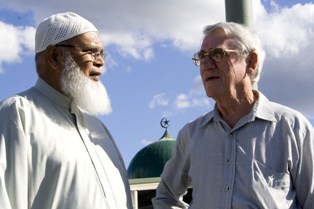
Last year the Maleny Uniting Church helped stage the first National Interfaith Festival. The event was a huge success and brought attention to the many groups within the Uniting Church in Queensland that are working together with people of other faiths.
Rev Garth Reed has been involved in interfaith relations for more than 30 years. As chaplain of Brisbane Boys College he used to take students to a Mosque as a way of teaching them about other faiths. Now, as the minister at Aspley Uniting Church, Mr Reed is surrounded by people who are interested and excited about learning more about other faiths.
In 2003 the Aspley Uniting Church began an interfaith dialogue. The first event, an evening focussing on prayer with members of the Bald Hills Mosque and local Jewish community, proved to be a fascinating and sought after event by members of all communities.
“I think interfaith is capturing some of the imagination of people today in the way the ecumenical movement did a generation or two ago,” Mr Reed said from the wide verandah of the Bald Hills Mosque. “It has got the same sort of motivation, spiritual awareness and concern for reaching out to the people of the world in love and hospitality without necessarily an evangelistic (in terms of converting the other) term. There is room for evangelism… but it is not the only means of expression of mission. I believe interfaith is a fundamental expression of the Christian’s calling through Christ to love the world.”
Imam Ikraam Buksh of the Bald Hills Mosque said the importance of interfaith relations is respecting each other’s differences. “We have differences with every person whether it be religion, status, understanding or career, but at the end of the day we are all humans and we have to leave our differences outside,” he said.
“We are not going to agree on our differences (that is the bottom line), but we can agree on those things we can unite on. I think at the end of the day the differences will never be solved, but every mature person understands that everybody has a difference, even a mother and a son, a daughter and a father, but they leave their differences aside and live in harmony. Why can’t two religions do that?”
Mr Reed agreed the differences between the two religions need to be understood, but should not stand in the way of a personal connection with others of a different faith. “It is too simplistic to say we both believe in Jesus,” he said. “We believe fundamentally different things about Jesus as the Christ and we need to talk about that. We still need to respect and love each other by acknowledging those differences and not trying to argue the other one into accepting our set of beliefs.”
Dave Andrews has been working together with people of other faiths for many years including assisting to resettle refugees in Brisbane for the past 20 years. “We haven’t really related to them as Muslims, rather as Iraqis or Afghanis,” he said.
Through his involvement in many organisations (including The Waiters’ Union, the Micah Challenge, and TEAR Australia), Mr Andrews has worked together with the Muslim community in Brisbane through organising joint events including a dinner at West End Uniting Church and a discussion and screening of the film The Imam and the Pastor.
“I think it is important to do interfaith things because Jesus suggested that sometimes the people that can be our greatest example of a Godly life are not people in our own tradition. That is the moral of the Good Samaritan story and we should take that seriously,” said Mr Andrews.
“With the growing anti-Muslim propaganda over the last few years we decided to do a few things that are specifically relating to Muslims and Christians. During the last Iraq war I went to the Mosque and said we need to reaffirm that we are people with an Abrahamic tradition and we need to stand against these people who are trying to divide us,” he said.
Bald Hills Mosque Chairman Ali Kurban said since 11 September 2001 he has noticed a shift in the attitude of the general public. “Twenty years ago no one asked any questions. We worked together. Now we are watched.” However, Mr Kurban said there was a great relationship between the Bald Hills Muslim community and the Aspley Uniting Church.
Mr Kurban and another Mosque member Ismail Ebrahim said the key to interfaith relations was to create peaceful communities. They both agreed there are a lot of comparisons between Christianity and Islam.
“It is the same God, just called different things,” said Mr Ebrahim. “We want people to be aware of each other’s religions and respect them.”
Mr Ebrahim also said the Muslim community in Queensland is very multicultural. “Some people get Islam confused with custom,” he said.
Mr Kurban talked of plans for a Mosque open day. “We want to create an openness. Everyone is welcome to come and see and ask questions.” He also assured Journey that the tea is better at the Mosque than at the local Uniting Church.
Copies of the film The Imam and the Pastor are available from Grosvenor Books on (03) 98221218 or email grosvenor.books@optusnet.com.au
Photo : Bald Hills Mosque Chairman Mr Ali Kurban and Aspley Uniting Church minister Rev Garth Reed at the Bald Hills Mosque. Photo by Mardi Lumsden
 JourneyOnline
JourneyOnline






